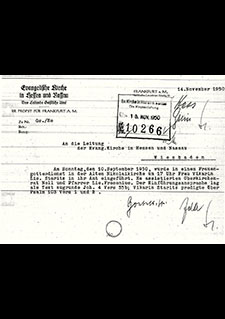Postwar Era
In January of 1945, Katharina Staritz fled with her sister and other family members before the advancing Red Army from Breslau to Marburg by way of Dresden. Since the Evangelical Church of Electoral Hesse-Waldeck did not have a Law on Female Theologians, she was hired by the church there only provisionally.
She worked as a substitute pastor in various congregations such as in Albertshausen, as a teacher and as a prison chaplain. Regional bishop Adolf Wüstemann additionally tasked her with drafting a proposed law on female vicars.
After problematic and protracted negotiations on an employment contract with full rights to preach and administer the sacraments, she eventually transferred to Frankfurt am Main in 1950 where she became the first ordained female theologian made a civil servant in the Evangelical Church in Hesse and Nassau – admittedly without the title of pastor and at a reduced salary.
She was assigned to work with women and given a preaching and ministry assignment at St. Catharine’s Church and Preungesheim women’s prison. Severely ill, she died on April 3, 1953 at the early age of fifty and was buried in Bockenheim Cemetery in Frankfurt.
For a long time, Katharina Staritz’s memory was kept alive only in her personal milieu. Her commitment in the Nazi era was only slowly recognized in church circles as well. This did not change until the end of the 1980s when she entered the focus of research on women and women’s resistance.
More recently, memorial plaques in the Church of St. Mary Magdalene in Breslau and in the Protestant church in Albertshausen commemorate her efforts for victims of persecution under the Nazi regime.
Source / title
- © Zentralarchiv der Ev. Kirche in Hessen und Nassau, Best. 354

